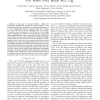Free Online Productivity Tools
i2Speak
i2Symbol
i2OCR
iTex2Img
iWeb2Print
iWeb2Shot
i2Type
iPdf2Split
iPdf2Merge
i2Bopomofo
i2Arabic
i2Style
i2Image
i2PDF
iLatex2Rtf
Sci2ools
116
click to vote
ICC
2008
IEEE
2008
IEEE
APOS: Adaptive Parameters Optimization Scheme for Voice over IEEE 802.11g
—In this paper we present APOS, a method for dynamically adapting the parameters of IEEE 802.11g to the estimated system state, with the aim of enhancing the quality of a voice communication between a mobile station and a remote peer node. The system state is estimated based on a number of counters that are collected by the MAC layer of the mobile station, regarding the number of successful and unsuccessful transmission/reception events, channel busy periods and idle slots. These statistics are processed to estimate the collision probability and the signal to noise ratio at the receiver side. Hence, a mathematical model is used to get the expected end–to–end network performance in terms of throughput, delay and packet error rate, for different settings of some PHY and MAC parameters, such as the modulation/coding scheme and the retransmission limit. The setting that is estimated to maximize the quality of service for the end user is then selected. Unlike other optimization mechan...
Communications | ICC 2008 | Mobile Station | Remote Peer Node | Unsuccessful Transmission/reception Events |
Related Content
| Added | 30 May 2010 |
| Updated | 30 May 2010 |
| Type | Conference |
| Year | 2008 |
| Where | ICC |
| Authors | Nicola Baldo, Federico Maguolo, Simone Merlin, Andrea Zanella, Michele Zorzi, Diego Melpignano, David Siorpaes |
Comments (0)

